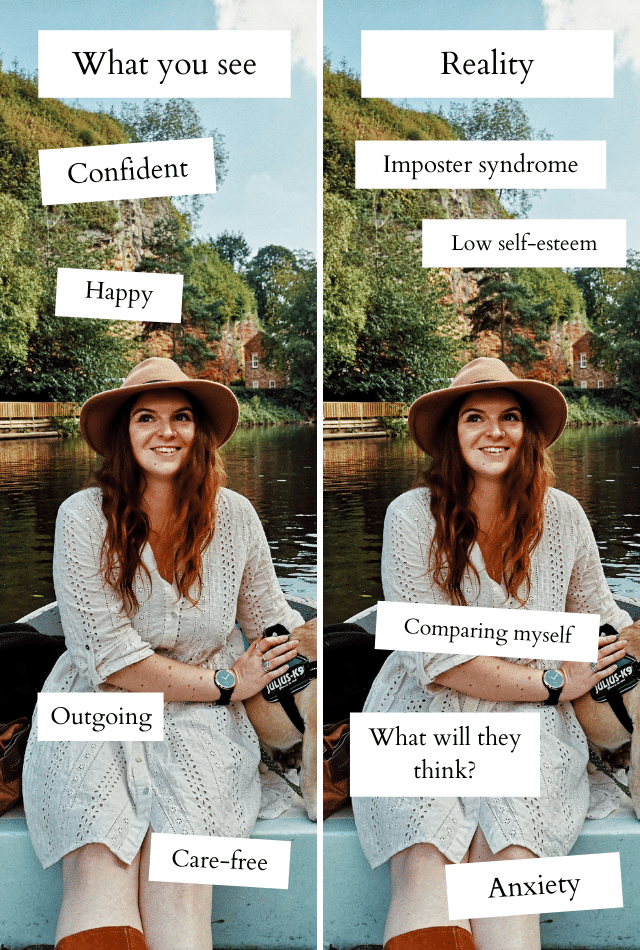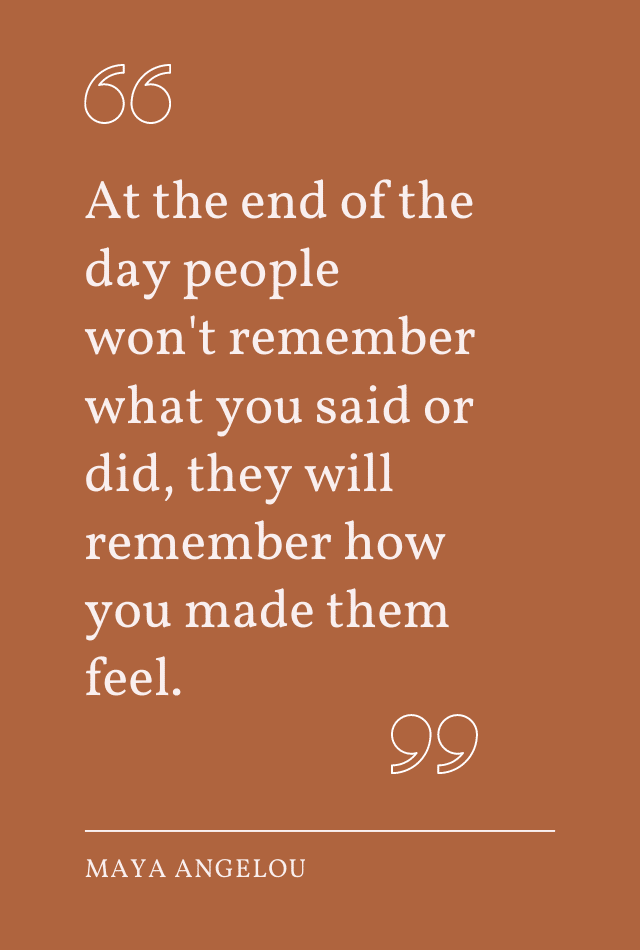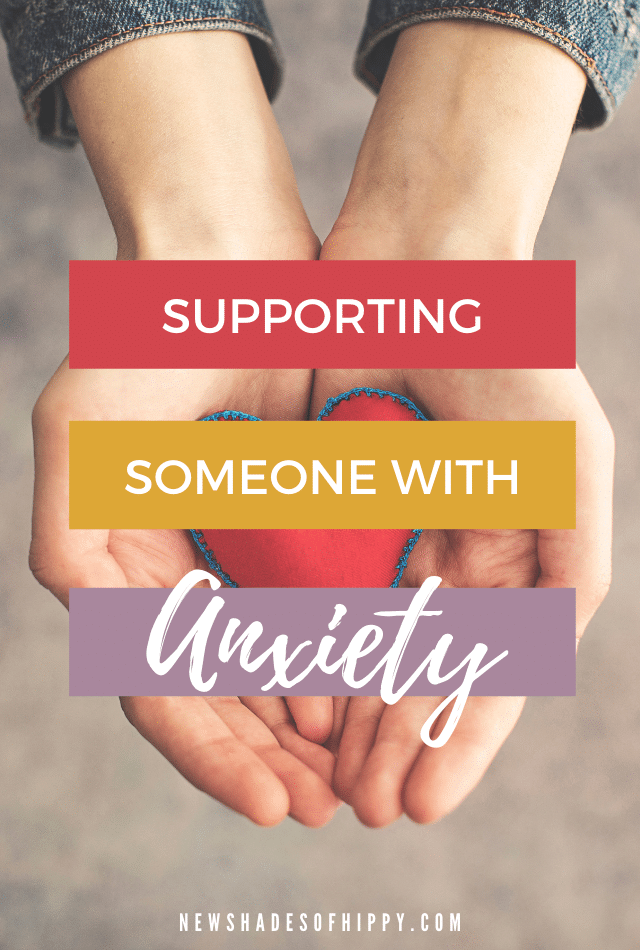
Mental health support has come a long way in recent years but those of us with anxiety are still often misunderstood. I’ve lived with the symptoms of generalised anxiety for many years now and that’s helped me understand the kind of support I need when I’m in a bad place. But what about those around us? How can we expect our friends and family to help us if they don’t really know how? With that in mind, I thought it was about time to share my side of the story from the perspective of someone who has experienced both good and bad support. Here’s my take on supporting someone with anxiety including what to say and what not to say.
I’m not a mental health expert. My words and advice come from my own personal experiences with mental health. What I can give you in this blog is empathy, compassion and support for those living with anxiety. If you, or anyone you know, needs someone to talk to, the Samaritans are here to listen. Call 116 123 anytime for free or see their contact page here.
What does anxiety feel like?
It’s important to start by saying that there are many different types of anxiety and it feels totally different for everyone. For me, anxiety tends to start as an uncomfortable feeling that something isn’t quite right. Or, if you want the explicit version, an underlying loss of control that scares me shitless. The kind of feeling you get in the pit of your stomach when you’re beginning to feel scared.
My anxiety can manifest itself as:
- Self-doubt
- Overthinking the worst possible outcomes
- Obsessive behaviours
- Random crying episodes
- Lethargy
- Not wanting to leave the house
- Negative thoughts
- The fear that everyone is doing better than me.

How to help and support someone with anxiety
Don’t take it personally
If you have a partner, friend or family member with anxiety, it can be really hard to not take things personally when they dip into a bad space. You may be feeling like you’re not enough to make them happy, or you’ve had the same conversations a thousand times over about their worries. But trust me, just by being there and listening, you are doing so much more than you think. They might not always say it but your support means the world.
Listen with no judgement
I get that no one likes to see others vulnerable or suffering but try to resist the urge to ‘fix’ an anxious person. Sometimes, they don’t need solutions right then and there, they just need a safe space to let it all out. If you jump in with judgements or your opinion, it can often stress them out more and make them feel like they’re not being listened to. Been there myself too many times!
“Advice on what to do from others is only good when it’s welcomed and I have the mental strength to build from.”
When I’m stuck in a place of irrational fear and worry, it’s not that I’m not listening to those around me, it’s that all my mental energy is being used and depleted through anxiety. As harsh as it sounds, I’m not really thinking about anything else because I feel like I’m surrounded by a heavy fog.
READ: An Open Letter: Social Depression and Spiritual Well-being
Things to say (and not say) to someone with anxiety
Avoid saying: “I don’t know what you want me to say”
I’ve had this said to me a lot of the years and to this very day, can confirm it has never done a single thing to help me feel better. Period. The thing is, I don’t even know what to say and I’m the one with anxiety! Oh, the irony.
Instead of seeing their suffering as a problem to fix, see it as a sign that they trust you on a deeper level than most. They have come to you at one of their lowest/stressed/anxious points and have chosen you to confide in. Revealing that you’re at a loss of what to say basically just offloads more guilt and pressure onto the person suffering. They don’t want to be a burden and just need someone to listen to them.

Avoid saying: “Just stop worrying so much”
Jeez, if these words could rid me of my anxiety, they’d be tattooed on me. And I’m not even joking. I understand those who have never suffered from anxiety getting frustrated and using this phrase. I really do. If I could escape my body and take a look at myself, I’d probably annoy me too! But here’s the thing, anxiety sufferers don’t choose to be the way they are. Just like any other mental health disorder or condition, it’s out of their control.
My anxiety is my brain’s way of telling me that I’m at risk or that something traumatic is going to happen (mostly stemmed from bad memories.) Most of the time, I’m fine but my brain is wired in such a way that I can’t just get rid of that hypersensitivity or alertness. The last thing that a person with anxiety needs is tough love and the added shame of ‘being too sensitive’ or ‘being weak.’ That kind of stigma isn’t welcome here!
Avoid saying: “Things could be much worse”
When you’re in the midst of an anxious episode, this is, quite frankly, the worst thing that someone could say. Trust me, I know how much worse things could be because guess what? I’ve already done all the overthinking for you. Perks of anxiety right there. All it does is bring in a tidal wave of guilt (which surprise, surprise makes us even more anxious.)
For those who need to hear this:
- You don’t need a justifiable reason to feel anxious, depressed or low
- You don’t need to have gone through a horrendous experience or have it particularly hard in life
- You have every right to feel how you feel, no matter what’s going on in the wider world
- You can have a seemingly perfect life and have everything going for you, yet anxiety can still rear its ugly head.
View this post on Instagram
Do say: “I’m here for you. What can I do to help?”
In my experience, this is the most supportive thing you can say to an anxiety sufferer. It means a lot and won’t be forgotten. It sends a message that you’re willing to listen and help in whatever way possible.
One day, it could be as simple as making them a cup of tea or going on a long walk to ease their anxiousness. Other days their anxiety may be so overwhelming that they need more support than usual. Remember that being there for someone doesn’t always manifest itself as it does in the movies (hugs, PJs and sleepovers etc.) Sometimes it’s just about sitting quietly with someone, listening to them or giving them some space to work through it.
Do say: “Take as long as you need”
Trying to hurry an anxious person into feeling better will not work. It only adds fuel to the fire (so to speak.) When I’m feeling anxious, it’s important that I’m not being rushed. Partly because I need time to process things but also because I need to talk it out in order to calm down.
By letting someone with anxiety know that they have your undivided care and attention, you are helping to make them feel safe. It could be that they only need a 10-minute chat or some words of encouragement. Whatever the problem, your patience is one of the kindest things you can give.
Do say: “What your feeling is valid”
Downplaying or dismissing someone’s feelings is never OK. Anxiety or not, it makes us all feel like shit, right? I talk openly about my anxiety now but there have been times where I’ve felt embarrassed and ashamed of it. I’ve often feared that people will laugh or think I’m overreacting.
Even if it’s hard to relate to the anxiety sufferer, let them know that it’s OK to feel that way and they’re not silly/dramatic/embarrassing for experiencing it. This assurance won’t stop the anxiety in its tracks but it will help with their confidence and trust.
“It’s easy to judge something we don’t understand and pass it off as strange or over the top. But when it comes to mental health, all that judgement does is add to the stigma.”
Getting support for anxiety
Whether it’s you that has anxiety or a loved one, it can be extremely tough to live with. Just remember that you’re not alone. Below I’ve put together a small list of UK mental health charities and organisations that can offer expert advice should you need it.
Anxiety UK
Support for anyone diagnosed with an anxiety disorder. Call 03444 775 774 or visit www.anxietyuk.org.uk
CALM (Campaign Against Living Miserably)
For men aged 15 to 35. Call 0800 58 58 58 or visit www.thecalmzone.net
Mind
Support and advice for anyone living with a mental health problem. Call 0300 123 3393 or visit www.mind.org.uk
In conclusion
Supporting a loved one with their mental health isn’t easy but please try to be patient and open-minded with them. We all want to feel cared for and valued so please don’t automatically assume that they’re overreacting. If you’re worried about someone with anxiety, try these simple things (alongside the advice above):
- Ask if they’re OK and pay full attention to the answer
- Offer your support whenever possible
- Listen and don’t judge
And that concludes my tips on supporting someone with anxiety. I really hope you have found them helpful and insightful. Do you have any examples of advice you would add?
Pin it for later


What a beautifully written post. Some great tips x